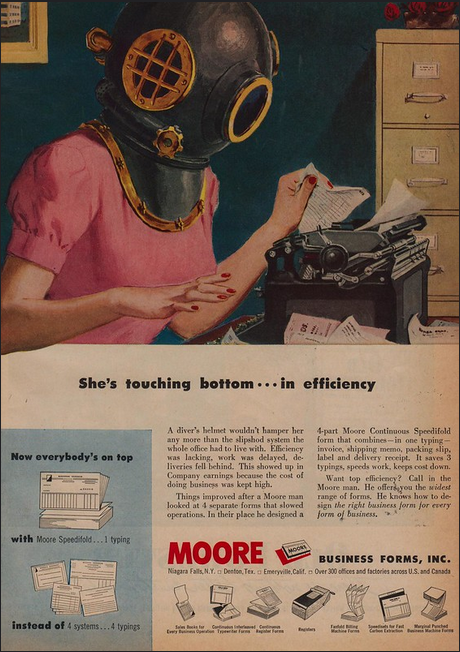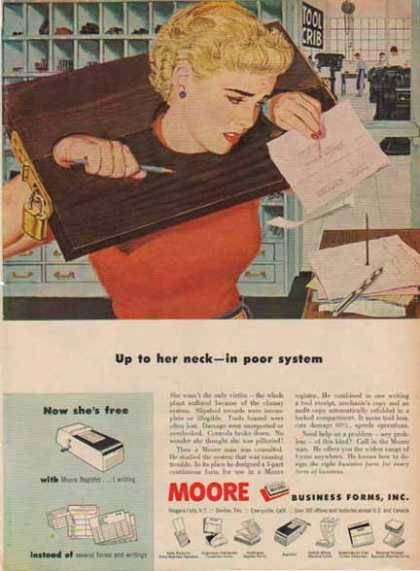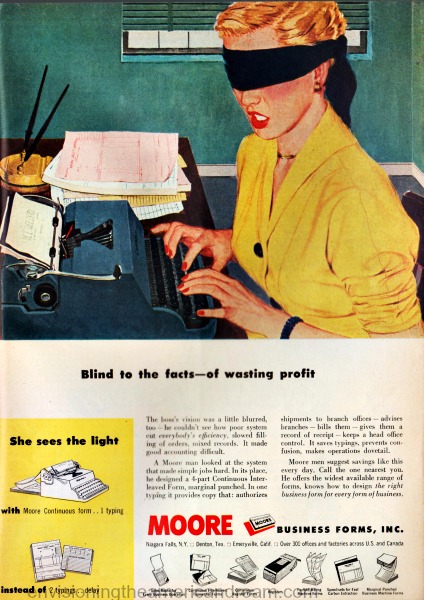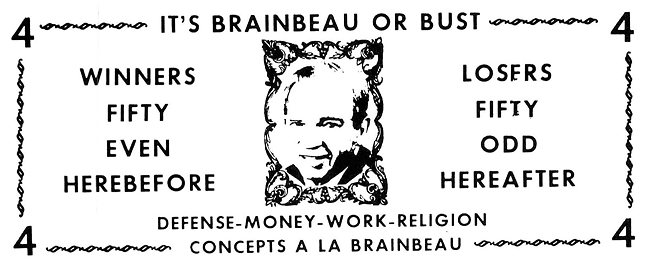Advertising
Follies of the Madmen #528
Our shirts will enable you to join the cast of Jackass.
Posted By: Paul - Sun Mar 27, 2022 -
Comments (2)
Category: Fashion, Stupid and/or Dangerous Products, Advertising, 1950s
Manikin Cigar Ads



Posted By: Paul - Thu Mar 24, 2022 -
Comments (1)
Category: Innuendo, Double Entendres, Symbolism, Nudge-Nudge-Wink-Wink and Subliminal Messages, Tobacco and Smoking, Advertising, 1970s
Follies of the Madmen #527
From the "nephew" school of art. "My nephew draws good--we'll get him to do the ad."
Posted By: Paul - Tue Mar 08, 2022 -
Comments (3)
Category: Ineptness, Crudity, Talentlessness, Kitsch, and Bad Art, Music, Advertising, 1970s
Alfred Sohm’s Time-Hiding Clock

Benton Harbor News-Palladium - July 18, 1940
The clock, first of its kind ever to be built, announces the hours by a complicated system of lights, buzzers, chimes, and bells. Its inventor proudly claims that several minutes will be required by the average person to tell from the new clock just what time it is.
While the person is trying to tell the time, he will receive all sorts of other information that is designed to distract his attention and confuse him even further. The revolutionary design of the new instrument is expected by its builder to make "clock watching" a fascinating pursuit.
While the new device is perhaps reminiscent of a Rube Goldberg patent, apparently there is a sound principle behind it. The object is to attract attention and discussion for advertising purposes. Instead of merely glancing at the hands of a clock to get the time, people using this clock will have to ponder a bit, and meanwhile they will be taking in concentrated doses of advertising.
Posted By: Alex - Tue Mar 01, 2022 -
Comments (2)
Category: Technology, Rube Goldberg Devices, Advertising, 1940s
Secretarial Sadism



Posted By: Paul - Tue Mar 01, 2022 -
Comments (4)
Category: Business, Advertising, Sadism, Cruelty, Punishment, and Torture, Women, Twentieth Century
Follies of the Madmen #526
Are these supposed to be 18-year-old coeds at university? If so, why do they look 45?From the SATURDAY EVENING POST for 1/14/1961.

Posted By: Paul - Thu Feb 17, 2022 -
Comments (8)
Category: Business, Advertising, Stereotypes and Cliches, Soda, Pop, Soft Drinks and other Non-Alcoholic Beverages, 1960s, Women
Brainbeauism
While serving in World War II, Lt. George E. Lemon suffered a head injury from a jeep accident. As he described it, this gave his brain a "tilt" which resulted in a "me-to-me talkathon" and ended with him realizing "the only way to end war, inflation, unemployment, trade deficits and death."Lemon stewed on his realization for almost four decades until he retired in the 1980s. Then he renamed himself J.C. Brainbeau and began placing classified ads in various magazines offering to share his comprehensive "4 WAY PEACE PLAN" with anyone who sent him a self-addressed stamped envelope. Those who responded to him, however, just received more ads.
Donna Kossy offers some analysis in her book Kooks: A Guide to the Outer Limits of Human Belief:
For Brainbeau, the ads themselves were esoteric truths. Those who sent Self Addressed Stamped Envelopes (SASE) to Brainbeau expecting to receive literature, products or information received even more ads! They revealed Brainbeau's plans, bit by bit, ad by ad. Several sheets of closely spaced Brainbeau ads could be fit together like a jigsaw puzzle, but the resulting picture would be just another sheet of ads.
I figured someone on the Internet would have archived Brainbeau's bizarro ads. But I found nothing. So below are some of his ads that Kossy reproduced in her book.
You can read more about Brainbeau at Kossy's Kook Museum, which is now archived at the Wayback Machine.



Posted By: Alex - Wed Feb 02, 2022 -
Comments (3)
Category: Eccentrics, Crackpots, Advertising
Follies of the Madmen #525
Posted By: Paul - Wed Feb 02, 2022 -
Comments (0)
Category: Sports, Advertising, Junk Food, Dogs, Asia
Follies of the Madmen #524
Posted By: Paul - Thu Jan 27, 2022 -
Comments (0)
Category: Robots, Technology, Advertising, Cats, Asia, Pregnancy
Join the Dodge Rebellion
I'm not sure what all the near-disasters that Pamela Austin was made to face had to do with a "Dodge rebellion," but apparently this series of ads was very popular in the 1960s.Info from Glamour Girls of Sixties Hollywood:
Posted By: Alex - Thu Jan 20, 2022 -
Comments (1)
Category: Advertising, 1960s, Cars

| Who We Are |
|---|
| Alex Boese Alex is the creator and curator of the Museum of Hoaxes. He's also the author of various weird, non-fiction, science-themed books such as Elephants on Acid and Psychedelic Apes. Paul Di Filippo Paul has been paid to put weird ideas into fictional form for over thirty years, in his career as a noted science fiction writer. He has recently begun blogging on many curious topics with three fellow writers at The Inferior 4+1. Contact Us |




